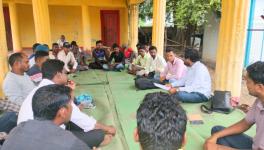Adivasis of India’s Tribal Belt Knock on Delhi’s Door
Representational use only.
New Delhi: Understanding the scope and reasons for anti-tribal violence necessitates a state-by-state comparison. Tribals are oppressed in various ways in every state. The sex industry rings exploit tribals in Madhya Pradesh, while counter-insurgency operations against Maoists in Jharkhand, Chhattisgarh and Maharashtra often victimise them. The motive for such violence, however, varies from state to state.
Tribals are constantly on the periphery of society; therefore, whatever systematic violence they encounter results from Indian civilisation's regular socio-economic processes.
On March 30, many tribal activists, journalists and human rights activists from Jharkhand, Chhattisgarh and Maharashtra came to the Press Club of India to highlight the contemporary situation in the tribal belt of India.
LONG WALK TO THE WOODS: SITUATION OF GADCHIROLI TRIBALS
Describing the state oppression in Maharashtra, Sainu Gota of Gadchiroli said, “Any resistance over ore mining in Gadchiroli is met with severe persecution by state troops. In Gadchiroli alone, 40,000 acres of land have been taken over for iron ore mining. Adivasis' livelihood is entirely reliant on the forest. Paramilitary troops harass those who go to harvest forest produce.”
Villagers in Maharashtra's Gadchiroli district have had to deal with some major changes over the years: iron ore mining in the forests and mountains, a wave of prosecutions and deaths of tribals in the name of suspected Maoists, and rising state militarisation in the forest, all of which they allege are harming the existence of culture and identity of tribal society. The villagers demand that the Forests Rights Act of 2006 and the Panchayats [Extension to Scheduled Areas] Act (PESA) of 1996 be implemented as part of their continued resistance to the contemporary mining issue.
According to Gadchiroli gram sabha members, mining will violate Adivasi regulations, and there is also a chance of contamination of the Parlakota river.
"There is an increase in police camps as the mining industry expands," says Rajashree Lakhami, a local Adivasi leader in Gadchiroli, when asked about the situation. She claimed that police camps are unnecessary for the Adivasis. The Adivasis have also been disturbed by the police camps. Many people are terrified to walk to the woods to collect essentials because of the armed outposts.
According to Lalsu Nogoti, a member of the Gadchiroli zilla parishad, indigenous tribes are frequently attacked. He believes that no constitutional protections are wholly implemented, such as PESA and other laws in the 5th and 6th Schedules, and that land is being taken for massive mining activities that benefit companies. Furthermore, paramilitary personnel are brought in when huge firms arrive, who harass, torture, rape, and murder Adivasis in phoney encounters. In each of the 100 villages, about 25 people have been arrested under the UAPA. He also cited Adivasis, who had been incarcerated for years in central districts of the country. He also spoke on Gondi's repression as a language in the Gondwana region.
STORMING THE GATES OF FREEDOM TO SPEAK THE TRUTH: STORY OF SILGER
Thousands of Adivasis from across southern Chhattisgarh went vast distances to attend demonstrations against constructing a Central Reserve Police Force camp in Silger village in Sukma district for over a year.
The region has seen escalating tensions over the construction of paramilitary camps in recent years. According to the government, they are expanding camps to facilitate road construction. Since 2020, several similar protests have occurred across the seven districts of the Bastar region against the construction of camps.
"State officials regularly disrupt protest sit-ins against establishing a paramilitary camp in Silger," says Raghu, an anti-camp activist. He believes that in Silger, the government's promises to protect its citizens have proven to be fraudulent.
"Even on the occasion of Constitution Day, hundreds of Adivasis and activists were arrested by police officers, wrongly accusing them of being Maoists," he adds.
Gajendra, a member of the Moolvasi Bachao Manch and another activist from Silger, said, "In the name of development, roads and camps are nothing more than a tool to destroy the Adivasi culture. Adivasis are not anti-development; they require it, but not at the enormous cost of their land, natural resources, or culture."
He stated that the police and government threaten the protesters with fake charges and death threats. He and Raghu were stripped naked and beaten up by the police for five days, resulting in serious injuries.
BREATHING UNDER THE FEAR OF MILITARY BOOTS: LIVING IN PARASNATH MOUNTAIN
The anti-camp and anti-mining protests have been widely taking place across Jharkhand for an extended period.
Anil Kisku from Jharkhand Jan Sangarsh Morcha said, "paramilitary troops are abducting and killing innocent Adivasi adolescents under the guise of 'encounter.' Several police camps are being established in Jharkhand's Parasnath mountains."
He related an event in which a person named Bhagwandas Kisku was detained by the police and falsely accused as a Maoist, even when it was common knowledge that he was a tribal activist. Anil also remembered the case of Motilal Baske in which he was slain by security forces in Dholkatta in June 2017, and was characterised as a Maoist. When villagers started outraging, they found out that he was a Doli labour and a shop owner.
According to other tribal activists from Jharkhand, the police do not even notify the relatives of individuals detained or arrested.
"The Indian government is launching a new war with operation Samadhan - Prahar against Adivasis of central and eastern India for looting the mineral-rich land," claimed noted journalist Rupesh Kumar Singh of Jharkhand.
He discussed the massive militarisation that is taking place in various sections of the country as part of this effort. He spoke on the unholy alliance between the Central government and the State government of Jharkhand in silencing the voices of Adivasis protesting police camps and the looting of Jharkhand's natural resources. He claimed that anyone who speaks out against the government's anti-people policies and capitalist theft is labelled a Maoist and targeted.
Himanshu Kumar, a notable Gandhian and human rights campaigner spoke out against paramilitary forces abusing their power in Chhattisgarh and other states such as Jharkhand and Maharashtra. He began by discussing how Muslims were manipulated into becoming terrorists since the locations where they lived had oil. Similarly, he claims that the government targeted the Adivasis because they reside in mineral-rich areas.
He claimed that the majority of paramilitary personnel are stationed in Adivasi areas to seize minerals. Not for the poor's growth, but for the capitalists'. He compared the ongoing fight against the people of central Indian states to the Ukraine-Russia conflict.
This battle against India's own people is the country's most serious conflict. He also stated that this violence will not be limited to the Adivasis and will affect non-tribals as well because the problem is tied to the environment.
Vikram Raj is an independent journalist based in Delhi. His views are personal.
Get the latest reports & analysis with people's perspective on Protests, movements & deep analytical videos, discussions of the current affairs in your Telegram app. Subscribe to NewsClick's Telegram channel & get Real-Time updates on stories, as they get published on our website.























